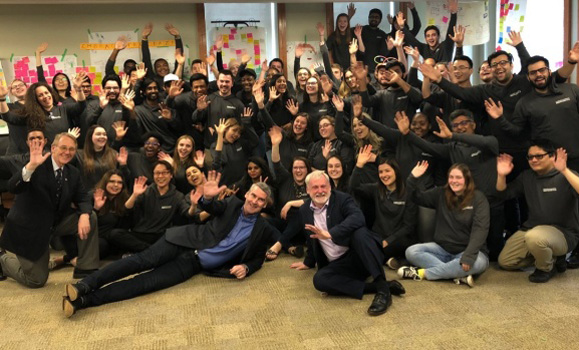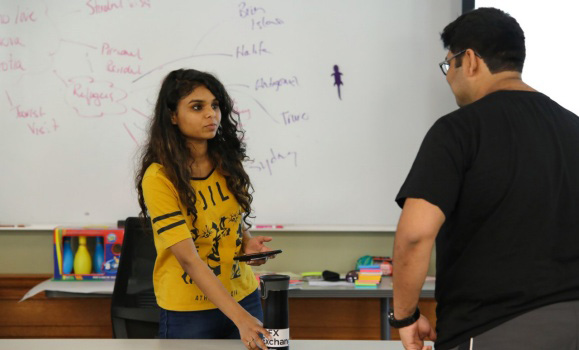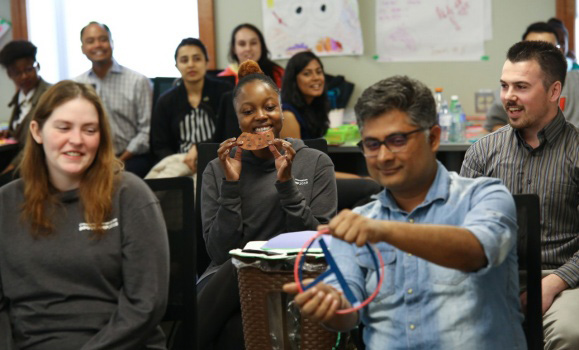For the second year in a row, ShiftKey Labs - the Dal-hosted innovation sandbox in the Goldberg Computer Science Building ÔÇô co-designed and delivered a province-wide bootcamp for budding entrepreneurs: the Creativity and Innovation Bootcamp.
Twelve H┬■╗ş students worked alongside 46 others hailing from seven universities and six other sandboxes to tackle one central issue facing Nova Scotian communities today: how might people who live in Nova Scotia reduce the amount of plastic and paper that ends up in the landfill?
Premier Stephen McNeil stopped by to see the innovation in action, giving a few words of support and encouragement for all involved.

Premier McNeil visits to show his support.
Collaboration is key
The aim of the bootcamp was to help students discover more about their own ability to create unique and impactful responses to real-world challenges, with design-thinking ÔÇö or human-centred design ÔÇö at its core.
Last year, teams competed for finalist positions over the course of three months. This year, the human-centered approach saw students also divided into smaller groups, but with the intent of splitting up across the multidisciplinary fields of study with the final objective of advancing stronger student connections within the cohort, and showcasing the real value that comes from collaborating within a diverse group of individuals.
ÔÇťAfter last year's Bootcamp, we felt that the best way to harness the collaborative potential of the entire cohort would be to remove the competitive project ÔÇśpitchÔÇÖ where the ÔÇśbestÔÇÖ team would win the prize money,ÔÇŁ says Grant Wells, manager of ShiftKey Labs.
ÔÇťI feel that the solutions generated were of a much higher quality, as teams maximized their learning without the barriers to collaboration.ÔÇŁ
Master of Applied Computer Science student and ShiftKey Labs student participant Shilpa Singh, was pleasantly surprised by the diverse culture backgrounds and fields of study that her peers brought to the bootcamp.

Shilpa Singh looks for feedback on her idea.
ÔÇťIt was great exposure for me; I got a chance to really expand my network,ÔÇŁ she says.
Design-thinking and problem-solving
The issue at hand was an easy one to get students to buy into. The topic of recycling and reducing contamination of items to be recycled is constantly trending across disciplines ÔÇö and has an impact on every citizen.
To help tackle the problem at hand, students spent their two weeks immersed in interactive workshops and learning the process, alongside time for independent experimentation. Students were equipped with a handful of approaches to problem solving and practiced new tools for testing and solving ideas.
When asked to reflect on their experience, most students highlight the lessons they learned in brainstorming, noting that their perception on how to approach it has been flipped on its head.
ÔÇťThis was a major life lesson for me on a new way of brainstorming,ÔÇŁ Singh says. ÔÇťJust by using simple techniques like writing your ideas on sticky notes, drawing stick figures to explain the solution, and following the whole procedure of human design thinking, I learned a completely new way of looking at a problem and finding the solution from peopleÔÇÖs perspective.ÔÇŁ
Students were also encouraged to actually get outside to observe peopleÔÇÖs behaviours and talk to them about what they were thinking. ÔÇťThe whole program was conducted in a way where we came up with a solution to a problem, without even realizing we were working on it the whole time!ÔÇŁ Singh adds. ÔÇťThis was really a once in a lifetime experience for me.ÔÇŁ

Team ÔÇťCarBinÔÇŁ demoing their prototype to address recycling on the road.
Students went from having little to no understanding of what design-thinking even meant to having enough confidence to work individually, in small groups, and a mash-up of groups ÔÇö all to develop ideas that led to solution-driven early prototypes that could impact our society.
ÔÇťNext year, we will continue to evolve the program and improve upon its success,ÔÇŁ says Wells. ÔÇťI would like even more Dal students to experience this amazing opportunity, take advantage of the variety of skills development programs offered at ShiftKey Labs, and the network of provincial sandboxes.ÔÇŁ
Asked what he feels the main value in activities like this is, Wells says, ÔÇťUltimately, it can be life changing for a student to join our open and welcome community. No matter what, it will further enhance their overall academic experience here at H┬■╗ş.ÔÇŁ

